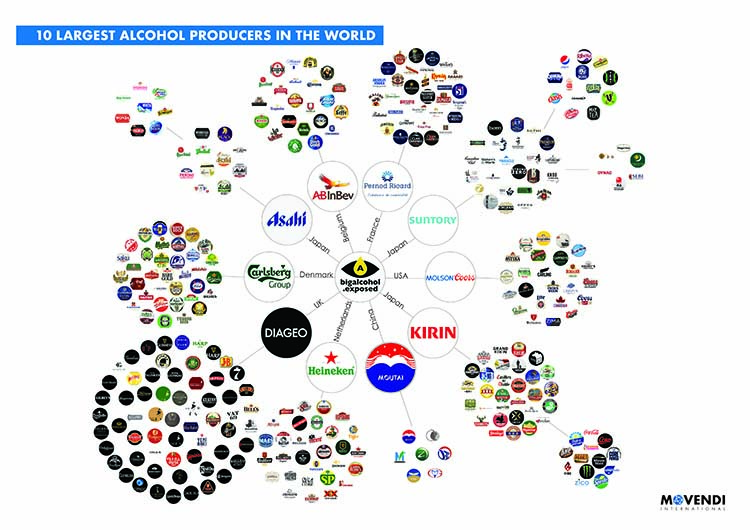Big Alcohol Commits To Selling Only Alcohol-Free During COVID-19 Crisis*
The ten largest alcoholic beverages companies in the world have announced their collective decision to halt all retail and promotions of alcoholic products and instead only sell alcohol-free beverages, for the duration of the COVID-19 crisis.
Better late than never: the biggest alcohol producers in the world have realized that their products play a major part in the burden and strain placed on the healthcare system in particular and society in general and acknowledge after years of denial and opposition that alcohol is in fact a massive problem reaching into all parts of society. Therefore, they have decided to remove all alcohol from the market and instead only sell alcohol-free products.
Alcohol clearly weakens the immune system of people who use it, and especially of consumers who have an alcohol use disorder; but alcohol is also through its harm to others than the consumers themselves having severe negative consequences for the healthcare system, for social services, and for economic productivity,” say the alcohol giants in a joint statement.
In times of crisis with extremely scarce resources, we have decided that we do not want to fuel additional burden and strain through our products and practices.”
The details about how this will be concretely solved will be released in the coming days.
The global alcohol burden – strain on health systems, draining scarce resources
Alcohol kills 3 million people worldwide every year.
Every ten seconds a human being dies because of alcohol. This represents 5.3% of all deaths and more than 5% of the global disease burden. Mortality resulting from alcohol use is higher than that caused by diseases suchas tuberculosis, HIV/AIDS and diabetes.
Alcohol harm is of epidemic proportions worldwide.
Worldwide, alcohol is responsible for 7.2% of all premature mortality. Alcohol harms young people disproportionately. Among people between the ages of 15 and 49, alcohol is in fact the number one risk factor for death and disability, accounting for 10% of all deaths in this age group.
Finally, major alcohol producers have come to realize that alcohol is one of the biggest threats to population health worldwide.
Alcohol is also a major obstacle to development, adversely affecting 14 of 17 Sustainable Development Goals. For instance, pervasive alcohol harm puts a heavy burden on health systems and poses a serious obstacle to reaching health for all. The epidemic levels of alcohol harm put a heavy strain both on national budgets as well as healthcare systems. To make matters worse, the disease, social, and economic burden of alcohol is rising, especially in low- and middle-income countries, which already can ill afford the associated productivity losses, healthcare costs, and household impoverishment.
- In Sri Lanka, 80% of General Practitioners were frequently confronted with patients who had alcohol use disorders;
- In the United States, alcohol harm costs society $249 billion, every year;
- In Kenya alcohol threatens the “Big 4 Flagship Initiative” that aims to advance sustainable development through bold action across four priority areas: manufacturing, universal healthcare coverage, affordable housing and food security;
- In India, alcohol harm costs more (1.45% of GDP) than the government’s entire health spending (1.1% of GDP) every year – costs that are largely shouldered by households; and
- The economic burden of alcohol worldwide is substantial, accounting for up to 5.44% of Growth Domestic Product in some countries.
Globally, at least 283 million people aged 15+ years suffer from an alcohol use disorder. That equals 5.1% of all adults worldwide. But health systems are already insufficiently equipped to adequately deal with only this specific type of alcohol harm, let alone alcohol-related injuries, trauma, violence and road traffic fatalities.
- In the United Kingdom, ca. 1 in 5 patients in the hospital system use alcohol heavily, and one in 10 are alcohol-dependent.
Big Alcohol, big harm, big realization

The ten largest alcoholic beverages companies in the world, in 2018, have now – finally – come to terms with their roll in this massive alcohol burden. They are ranked according to total annual sales (domestically and internationally), as of December 2018. Company sales may include products other than alcoholic beverages:
- Anheuser-Busch InBev US$56.4 billion (up 23.7%)
- Heineken Holding $24.7 billion (up 7.4%)
- Asahi Group Holdings $19.4 billion (up 23.6%)
- Kirin Holdings$16.6 billion (down -13.1%)
- Diageo$15.7 billion (up 3.3%)
- Suntory Holdings $11 billion (up 21.3%)
- Molson Coors Brewing $10.9 billion (up 122.4%)
- Pernod Ricard$10.2 billion (up 5.2%)
- Carlsberg$9.4 billion (up 1.1%)
- Kweichow Moutai $8.5 billion (up 70%)
— END
*Note the date of this story
